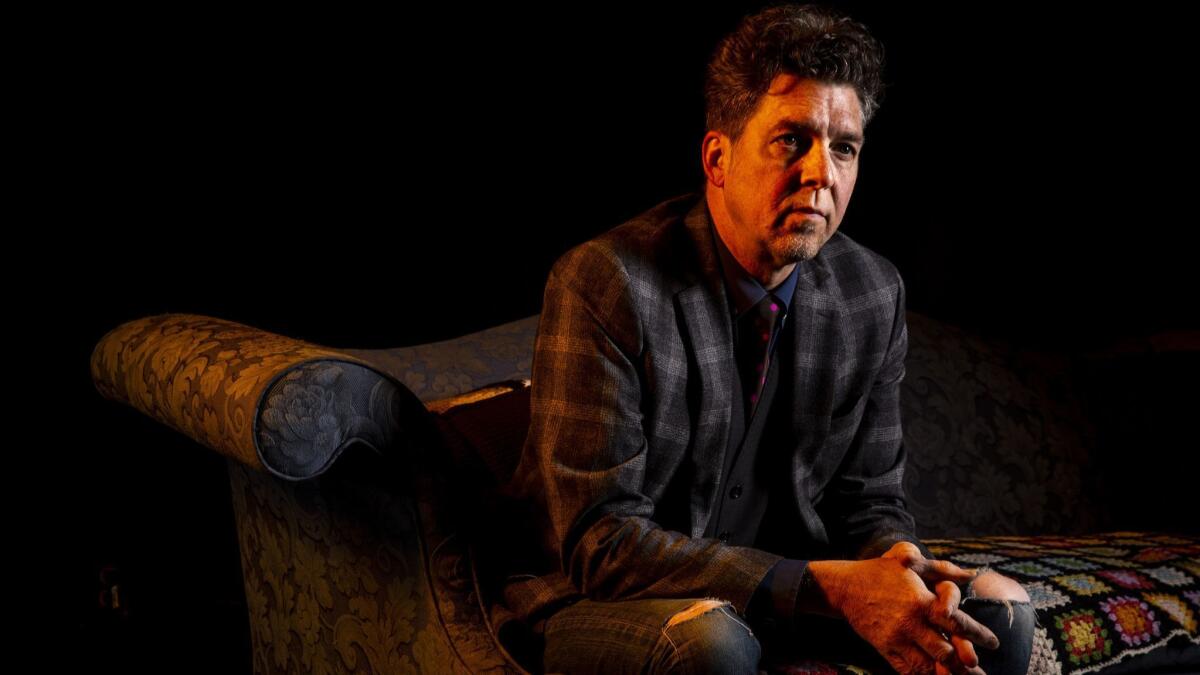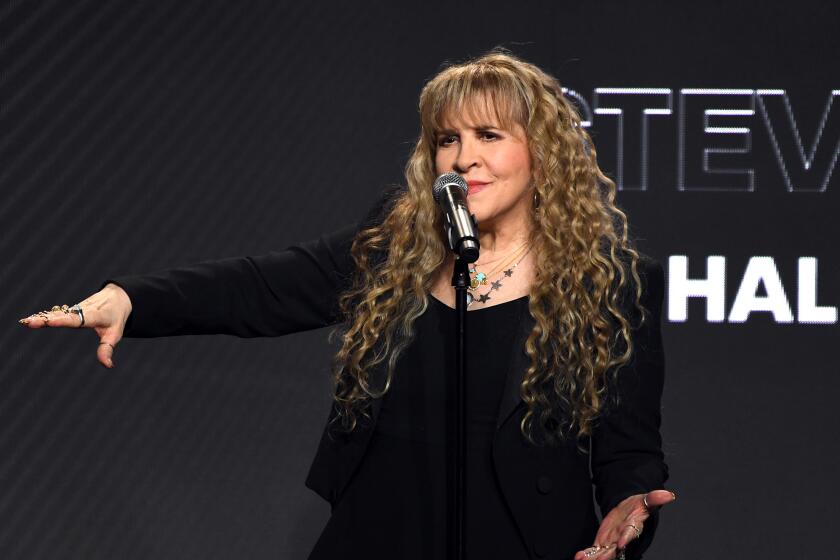Joe Henry reveals cancer diagnosis at Largo concert: ‘This is my journey’

- Share via
Joe Henry has long displayed a penchant for hats. In performance, and often in everyday comings and goings, the singer, songwriter and producer might sport a stylish fedora, porkpie, Homburg or other smart men’s headwear.
“Rodney Crowell said to me one day, ‘Son, a hat is not a toy.’ He was edifying me,” Henry said in a 2017 New Yorker profile. “I wear a hat because I’m a ginger and a Celt in Southern California.”
But when he stepped onstage Saturday at Largo for his first public performance in a while, the 58-year-old musician arrived hatless, save for a top hat placed upside down at the front of the theater’s stage.
He used it as a talking point early in his 90-minute solo performance, which had been labeled on fliers, “Singing New Songs and Old/Casting a Cold Eye on Life, on Death,” telegraphing that there was more at stake than simply an evening’s entertainment.
As Henry, one of pop music’s most literate and eloquent figures, is wont to do, he waxed poetic about the subject at hand, in service of a larger point: “There are times in life when a wind knocks the hat off your head and you have to chase it down the street, dust it off and reset it.”

For Henry, a key point of this show was to share with the friends, family members and fans on hand that his re-set stems from a medical diagnosis of Stage 4 prostate cancer — a situation he was quick to try to place in context.
“Where a song comes from,” he suggested, “is not what a song is… I don’t write cancer songs.”
He also suggested that he doesn’t consider his songwriting to be autobiographical, in the literal sense, “but that doesn’t mean they are not personal.”
The show became all the more personal for the presence of his wife, Melanie, and their daughter — their son, musician Levon Henry, is traveling and couldn’t attend — as well as friends and peers including Van Dyke Parks, Sam Phillips, the Milk Carton Kids’ Joey Ryan, musician-author Paul Zollo and ace studio drummer Jim Keltner.
Yet the revelation about his medical condition, he said, has inspired him to write a batch of new songs, which he delved into in the second half of the show, after revealing his diagnosis. In response to a few gasps from audience members, he said he had done the same at receiving the news.
Some of his new compositions are disarming, poignant and vibrant ruminations on what matters in life, others more oblique explorations of the multitude of thoughts and feelings his condition has sparked. And as often has been the case with his elliptical style of writing, the new songs warrant repeated exploration to reveal themselves.
“Some people find my songs confusing,” he said, a remark that elicited chuckles from the audience. “Some are blurry, because the topics they deal with are blurry. I come out of the poetic tradition as much as the folk tradition,” he said by way of illuminating songs that are not simple narratives or black-and-white morality plays.
“John Cage said, ‘We see that nothing was lost when we gave everything away.’ I want to live like that,” Henry said, adding, “That doesn’t mean I don’t want to make a living. I’m talking about a spirit of generosity.”
He also quickly moved to set the audience’s worries at ease, saying “I’m OK… I don’t know if I can be cured. But I do know that I can be healed.”
He concluded his set with a new song, “Orson Welles,” which he confessed, “I’m not sure what it’s about.” At the end, it segued into a bit of Van Morrison’s “Listen to the Lion,” repeating as a mantra its refrain, “I shall search my very soul/For the lion inside of me.”
In a separate interview with The Times, Henry elaborated, saying he has responded well to the treatment he has received in the form of “a pharmaceutical cocktail” that has, so far, beaten back the cancer, making his prognosis for now very encouraging.
For some time before being diagnosed, Henry said he’d experienced lower back pain, which he wrote off to “being in my 50s and still being a touring musician. There seemed no point in complaining.”
But while in Ireland last year on a two-month writing sabbatical, he said he began experiencing “incapacitating pain.” Yet even after initially seeking medical advice, “I was told there was nothing to worry about.” He insisted on getting an MRI, which revealed the prostate cancer.
After being diagnosed in November, he essentially withdrew from his regular postings on social media, and he canceled some previously scheduled concerts, prompting friends and fans to contact him, asking, “Are you OK?”
A turning point came in December, when a friend suggested he go see the Aretha Franklin concert film “Amazing Grace” while it was briefly in theaters for an Academy Award qualifying run.
“My gut reaction was, ‘No, I don’t want to leave the house,’” he said. “Immediately, I knew that response was a mistake. That wasn’t the attitude to take into this.”
He came to the conclusion that “it would be disingenuous not to say anything” in public about his situation, and so he booked the Largo show — in part to share his experience with others who are going through the same thing or who have loved ones who are.
“Anyone who’s been on this planet for a while and is interested in any kind of evolution or understanding knows that it can only come through being of service,” said Henry, who has collected three Grammy Awards for producing albums by soul singer Solomon Burke, Americana group the Carolina Chocolate Drops and folk hero Ramblin’ Jack Elliott.
He’s also produced or co-produced albums for a raft of others, including Allen Toussaint, Joan Baez, Bonnie Raitt, Jimmy Scott, Mose Allison, Bettye Lavette, Mavis Staples and Loudon Wainwright III.
Among the musical touchstones for the balancing act he’s attempting are Wainwright’s body of work, which often seamlessly weaves together the comic and the tragic, the sublime and the ridiculous, and the example of singer-songwriter John Prine, who has continued writing, recording and performing for two decades since undergoing the first of several rounds of treatment for various bouts with cancer.
“What John has been doing is nothing short of heroic,” said Henry, who has scheduled a return visit to Largo for July 13. “When he finished his show at the Ace Hotel last year, did his dance offstage at the end of ‘Lake Marie,’ then came back by himself and sang ‘Six O’Clock News,’ it’s hard to speak about how powerful that was.”
As Henry views it now, “This is not an obstacle to my journey — this is my journey.”
Follow @RandyLewis2 on Twitter.com
For Classic Rock coverage, join us on Facebook
More to Read
The biggest entertainment stories
Get our big stories about Hollywood, film, television, music, arts, culture and more right in your inbox as soon as they publish.
You may occasionally receive promotional content from the Los Angeles Times.










